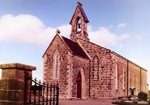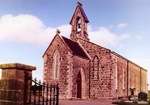Sermon for Sunday, 27th December 2015 (First Sunday after Christmas)
“And Jesus increased in wisdom and in years, and in divine and human favour.” Luke 2:52
The Bible tells us little about the first thirty years of the life of Jesus, Saint Mark and Saint John begin their account of the Gospel when he has reached adulthood. Saint Matthew and Saint Luke tell of his birth and infancy; only Luke tells us anything about his childhood, and then only the briefest of glimpses.
When we read the story of Jesus going up to Jerusalem for the Passover festival at the age of twelve, what things might we learn? What lessons are there for us in the behaviour and the reactions of Mary and Joseph? The word “pass” provides us with an acrostic to think about the story, past, assumptions, search and saw.
The story focuses upon Jesus’ parents. Verses 41-42 tell us about their regard for the past. “Now every year his parents went to Jerusalem for the festival of the Passover. And when he was twelve years old, they went up as usual for the festival.” Mary and Joseph have both had encounters with angels prior to the birth of Jesus, they are aware that this child is one anointed by God, they know great things are going to happen, but they nevertheless regard the fulfilment of the Law and the observance of its traditions as something important. Mary and Joseph are looking forward to the future, they are looking forward to something new and different, but they hold on to what was important from the past.
Is there a lesson there for the church and for ourselves as Christians? If Mary and Joseph think tradition is something to be conserved and cherished, Christians should be careful about casually discarding what has gone before, because that tradition has been one through which people have met with God.
The story continues with an assumption in Verses 43-44, “When the festival was ended and they started to return, the boy Jesus stayed behind in Jerusalem, but his parents did not know. Assuming that he was in the group of travellers, they went a day’s journey. Then they started to look for him among their relatives and friends.” Jesus’ parents are content to walk for a whole day without seeing him, so they must have seen his behaviour as nothing unusual. It is a fascinating insight into the years of Jesus’ youth, obviously he was like any other young person, he was looking for his independence, he was spending time with his friends.
What assumptions do we make about Jesus? Do we assume him to be someone whose entire life was concerned with “religious” things, or do we think about what it meant for him to be fully human? It is because he lives a human life, with all that it meant to be human, that Jesus understands us.
In Verses 45 -46, we read of Jesus’ parents search for him. “When they did not find him, they returned to Jerusalem to search for him. After three days they found him in the temple.” The verses leave us with more questions than answers. Presumably, Mary and Joseph took a day to return to Jerusalem, what things went through their minds as they journeyed? What fears would they have had? Then they arrive in the city and they search for Jesus, but where did they go? They would have returned to the house in which they had lodged during the Passover, but, once they had discovered that Jesus was not there, where did the go next in their search? Why is it the third day before they go to the Temple and find Jesus there? Wouldn’t it have been an obvious place after they had discovered that Jesus was missing?
Had we been the parents of Jesus, where would we have searched? If we were looking for Jesus today, where would we expect to find him? Are we like Mary and Joseph, do we fail to find Jesus because we are looking in the wrong place?
The final word from the acrostic is “saw.” Verse 48 says, “When his parents saw him they were astonished; and his mother said to him, ‘Child, why have you treated us like this? Look, your father and I have been searching for you in great anxiety.'” Given all that Saint Luke has told us about the birth and infancy of Jesus, the reaction of Mary raises questions. Why were they astonished? Has Jesus not previously displayed great understanding of the Law? Is this their first glimpse of what lay ahead. The astonishment is quickly followed by a maternal chiding, Jesus is reminded he is a twelve year old, “Child”, Mary calls him, and expresses the hurt she and Joseph have felt. Jesus seems confused by Mary’s reaction, in Verse 49 he says to his parents, “Why were you searching for me? Did you not know that I must be in my Father’s house?’”Saint Luke realizes that the answer Jesus gave raised only more questions, “But they did not understand what he said to them”, he writes in Verse 50.
The story is a reminder to us that seeing does not necessarily mean understanding, that as Mary and Joseph saw Jesus but did not find an answer to their questions, so there may be many moments when we “see” but do not understand. Verse 51 says that Mary “treasured all these things in her heart” and, like Mary, we may have much in life that makes us ask questions and sometimes things that we will treasure in our hearts.
The past, assumptions, searching and seeing: parts of the story with lessons to teach us and learning those lessons, may we reach Verse 52, “And Jesus increased in wisdom and in years, and in divine and human favour.”
So may we grow in our faith in him and in his favour in the year to come



Comments
Sermon for Sunday, 27th December 2015 (First Sunday after Christmas) — No Comments
HTML tags allowed in your comment: <a href="" title=""> <abbr title=""> <acronym title=""> <b> <blockquote cite=""> <cite> <code> <del datetime=""> <em> <i> <q cite=""> <s> <strike> <strong>